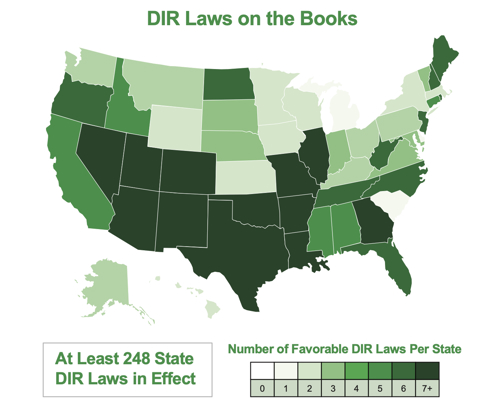Organized dentistry leaders share how more voices can sustain momentum for dental insurance reforms

Dentists regularly rate dental insurance issues among the most important concerns facing the profession today.
The good news: Many reform measures that improve how patients and dentists experience and use dental insurance have passed in recent years, and these reforms shift the balance of power from insurance companies back to the dental office — which, in turn, strengthens doctor-patient relationships.
In fact, from 2018 to 2023, state dental societies — with the help of the American Dental Association’s State Public Affairs program — have successfully advocated for 149 new state laws that have helped tip the scales in favor of dentists and patients. With these new laws, there are now at least 240 dental insurance reform laws on the books across the U.S.

When multiple states are fighting for similar reforms, that’s not lost among dental insurance companies.
“They are very aware of what the ADA is doing,” said Mark A. Vitale, D.M.D., chair of the New Jersey Dental Political Action Committee. “That is where the strength in numbers comes in — they pay attention when dentists come together to move the needle on issues that are important to dentists and their patients. That’s why our tripartite’s unified voice is critical as we work to make change across the nation.”
New Mexico is an example of the trending success in reforms. The state’s new dental insurance law included five unique and significant issues, including assignment of benefits, network leasing, prior authorization, virtual credit cards and retroactive denials.
“We’re working on multiple fronts across the country at the same time together,” said Tom Schripsema, D.D.S., executive director of the New Mexico Dental Association. “With the help of the ADA, we’re able to have a larger impact and lay the groundwork first with the credibility and then provide background information on issues that took a lot of time and preparation before the bills were able to get passed.”
"There’s no other group that is actively lobbying for you in the field of dental insurance,” said Duc “Duke” Ho, D.D.S., Texas Dental Association delegate to the ADA. “At the end of the day, the work that the ADA is doing for dental insurance reform is about making dentists’ lives easier — by eliminating the burdens that keep you from getting your money sooner.”
Here are a few of the recent wins for dental insurance reforms across the country:
• Assignment of benefits laws require dental insurers to pay claims submitted on behalf of their subscribing patients directly to dentists — regardless of whether the dentist is in network with the carrier — if subscribers request it. Half of states have implemented laws on this topic.
• Retroactive denial laws establish reasonable limits on the time insurers have to claw back claim payments made to dentists if they discover they paid the dentist in error. Two states have enacted these laws so far in 2023, adding to the many states enacting retroactive denial laws over the years.
• Virtual credit card laws give dentists the freedom to choose the form of payment by an insurance carrier and not be limited to virtual credit cards only. Insurers are increasingly using virtual credit cards that force dentists to pay a fee in order to receive the funds.
• Prior authorization laws require dental insurers to pay what they promised in the authorization. Rather than fighting for payment on authorized services, dentists can rely on this law to ensure insurers actually pay for services they authorize. Five years ago, there were no prior authorization laws. Now, there are 13 states with these laws.
• Network leasing laws expand transparency before a dentist’s in-network relationship with an insurer is rented to another insurer and provide an opportunity for dentists to accept or refuse a new leasing relationship without penalty. Twenty-one states have these laws that include the opt-in/opt-out option on the books as of 2023, up from zero in 2018.
Oregon is just one state that has recently passed network leasing laws. Barry Taylor, D.M.D., executive director of the Oregon Dental Association, credits the passage to the collective efforts of his organization and the ADA.
“Thanks to our partnership, we were well aware that this issue had begun to arise in other states, so we were able to get ahead of the curve on it before it became a significant problem for our members,” Dr. Taylor said. “Because the ADA shared resources from other states and provided guidance throughout the process, we were able to quickly and easily get the law passed.”
“The dental insurance maze can be daunting for patients, dentists and dental team members,” Dr. Vitale said. “The best way to minimize confusion and inequity is for dentists to ask questions so that they can then educate their team members and their patients about their dental plans. Dentists taking an active role in organized dentistry and advocating for insurance reform is key to reducing confusion. Dentists and dental team members need to stay informed because dentists don’t know what they don’t know. If you’re not already in contact with your local dental society, read the latest information shared by the ADA and others and ask questions.”
While the collective efforts of the ADA and state and local dental societies have resulted in numerous recent wins, there are some limitations to what the ADA can do. To help dentists overcome these challenging issues, the ADA offers the Third Party Payer Concierge program, in which ADA members can work with a designated expert for insurance-related issues and access the latest dental insurance information to navigate the nuances of doing business with dental insurance companies.
“Even though insurance companies will always have more money than a small statewide nonprofit organization [like a state dental society], the ADA helps us level the playing field thanks to the insights they have from working on these laws every day,” Dr. Taylor said.
For more information about the ADA’s work with the states on dental insurance reforms, visit ADA.org/DIR.



